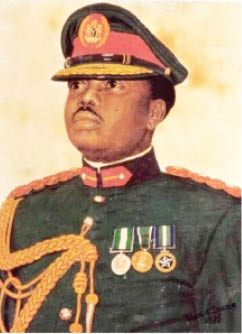49 years on, Murtala’s legacies still visible
Today marks 49 years since Nigeria’s fourth head of state, General Murtala Ramat Muhammad, was killed in an abortive coup while driving to his office in Lagos. With the manner references are made to his regime, many find it hard to believe he spent less than seven months or precisely only 200 days in office. […]

cover daily
Today marks 49 years since Nigeria’s fourth head of state, General Murtala Ramat Muhammad, was killed in an abortive coup while driving to his office in Lagos.
With the manner references are made to his regime, many find it hard to believe he spent less than seven months or precisely only 200 days in office.
His brief tenure could serve as a lesson to today’s political leaders who often whine about lack of time, insisting that four, or in some cases, eight years, which represent two terms in a democracy, are not enough for them to make meaningful impact in governance.
Within just six months that Murtala, as he was fondly called, held office between July 1975 to February 1976, he proved that much can be done even within a short period and that it is the will to make an impact that matters and not the length of time spent in office.
- Residents commend KEDCO for repairing power substation in Jigawa
- Cop who allegedly defiled 17-year-old girl at police station remanded
It was as if he knew that time was not on his side. He did not waste time blaming his predecessors. He was decisive. Every decision he took was inbuilt with a clear time frame to seeing it through.
He wanted everything to happen instantly and in the process of issuing orders, coined the phrase ‘with immediate effect’ which he battologised, to express his zeal to seeing things done as quickly as possible.
Identifying corruption as the albatross hampering Nigeria’s development, he went straight for its jugular and not a few were penalised for corruption.
He set out to reposition the civil service to be more focused on service delivery leading to a mass purge that caught thousands unaware. The entire nation got the message: with Murtala, there was no time for pandering to bureaucratic niceties.
Another major action taken by the Murtala administration was the creation of an additional seven states. He announced the creation of the additional states from the 12 he inherited from the previous regime on February 3, 1976, 10 days before he was killed.
Murtala was instrumental to the relocation of the nation’s capital when he set up the Akinola Aguda panel that recommended the movement of the federal capital territory from Lagos to Abuja on the same February 3, 1976, making it possible to decongest Lagos and for the current federal capital to be where it is today.
One of the sins of the Yakubu Gowon administration was that it dilly-dallied on the issue of returning the country to democratic rule. But the man who wanted everything done with immediate effect preferred not to dither on that. He set the machinery in motion for a return to civil rule which was achieved by his successor on October 1, 1979.
On the international stage, Murtala made Nigeria’s presence on the world stage felt when he castigated the US’ support for the apartheid system in South Africa.
While giving a speech at the extraordinary meeting of the defunct Organisation of African Unity (OAU) in January 1976, the Nigerian leader, who made Africa the centrepiece of his foreign policy, gave what has remained one of the most quoted texts in the history of that body.
Murtala said: “Africa has come of age. It’s no longer under the orbit of any extra continental power. It should no longer take orders from any country, however powerful. The fortunes of Africa are in our hands to make or to mar. For too long have we been kicked around: for too long have we been treated like adolescents who cannot discern their interests and act accordingly.”
It was said that it was only during his time that the notorious Lagos gridlock thinned out as people, realised the body language of the new helmsman and would rather not break traffic rules.
His administration was however, been criticized for the mass purge in the civil service and the manner it was handled.
Some said that particular action created fear among civil servants who were traumatised by the fact that they could lose their jobs at any time and made them desperate to grab what they could when they had the opportunity.
His role as commander of the 2nd Infantry Division of the Nigerian Army during the civil war also came under severe attacks due to the high number of civilian casualties.
But the fact that Murtala ruled with charisma and inspired many to take leadership seriously was not in doubt.
Nigerians were beginning to adjust to a life of self-discipline and hard work as inspired by the regime when all of a sudden everything came to an abrupt end.
Murtala’s death on February 13, 1976 was felt deeply across the length and breadth of the country. The 200 days of action had evaporated too soon and ‘with immediate effect’ leaving many to recall the eventful period with nostalgia.
It was not for nothing that successive regimes usually claim they are offshoots of his administration and many tried to copy his zero tolerance for corruption.
Nigerians believe Murtala tried his best to transform the country as evidenced by the many monuments including the Lagos International Airport and the N20 note which carries his portrait.
It is not a coincidence that he is the only Nigerian head of state who, without prompting, is fondly referred to by his first rather than his surname.
